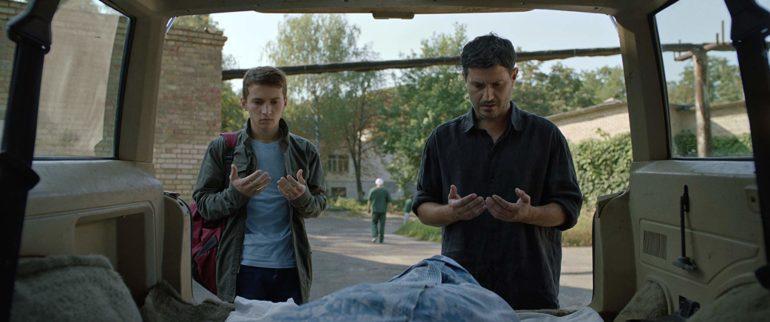Cannes Film Review: ‘Homeward’
By Alissa Simon
LOS ANGELES (Variety.com) – Visually striking, but narratively undernourished, the father-and-son-bonding drama “Homeward” unfolds against the backdrop of a fraught road trip from Kyiv to Russia-annexed Crimea and marks a flawed debut from young Ukrainian helmer-writer Nariman Aliev, a Crimean Tatar. Indeed, the plight of Crimean Tatars (both historically and currently) forms an important element of the plot. While the subtle connotations surrounding which of the film’s different languages are spoken in various situations may not be understood by all viewers, the mixed feelings of love and resentment between father and son — and their pride in their Tatar heritage and homeland — come through loud and clear.
As the film opens, Kyiv college student Alim (the helmer’s cousin Remzi Bilyalov, an affecting non-pro and also the star of his 2016 short “Without You”) and his father Mustafa (Akhtem Seitablayev), newly arrived from Crimea, are paying a visit to one of the capital’s morgues to claim the shrapnel-pocked body of Alim’s older brother Nazim (Anatoliy Marempolskiy), one of many Ukrainian soldiers killed in the conflict with Russia.
Even though Nazim lived in Kyiv with his Ukrainian Orthodox wife Oleysa (Dariya Barihashvili), the fierce Mustafa brusquely insists on taking his son’s body back to Crimea for a Muslim burial next to his mother’s grave, and won’t allow Oleysa to travel with them. A complicated backstory of familial estrangement is hinted at (it’s the first time Mustafa and Oleysa have met; Mustafa doesn’t know what Alim is studying; Oleysa talks about Mustafa being dangerous), but is never further elaborated or explained, much to the detriment of plot logic.
Regardless of what may have happened in the past, there is definitely a gulf that is greater than generational in the relationship between the street-smart Mustafa and the now-citified Alim. Symbolizing this, they have only one shared language: Crimean Tatar, a Turkic tongue not related to Slavic languages.
Like many Crimean Tatars of his generation, Mustafa grew up in Uzbekistan, where his relatives were deported in 1944. He learned Russian in school and Soviet ways of doing business. As Mustafa drives south and west with Alim, we see this style in operation as he tries to get his way with bribes or brute force. Meanwhile, teenager Alim wasn’t even alive during the Soviet period. And he speaks fluent Ukrainian, the tongue in which he converses with everyone else except his father.
As Mustafa and Alim encounter and (sometimes less credibly) solve many problems en route to Crimea, a wary mutual respect grows between father and son. But at the same time, it gradually becomes clear that Mustafa’s crazily intense rush to bring Nazim’s body to the homeland is not just about the Muslim tradition to bury the dead as soon as possible.
In addition to being short on character development and narrative logic, the universe of the screenplay penned by helmer Aliev and Marysia Nikitiuk, from an idea by first A.D. Novruz Hikmet, is definitely a male chauvinist one. Women, whether Olyesa or the mechanic’s granddaughter Masha (Veronika Lukianenko), are depicted as temptresses who lure Mustafa’s sons into trouble. Although Alim at first seems shocked by his father’s treatment of Oleysa and stays in touch with her by phone, he later abruptly dismisses her.
Apart from the curiosity value of the film’s look into the lives and traditions of Crimean Tatars, its strongest suit is the impressive cinematography by Anton Fursa. He frames the characters in tight closeups when in Kyiv and in the car, but as they approach Crimea, beautiful yet austere shots of the natural surroundings become more prominent. Particularly unforgettable are the visuals during the climactic scene that depicts Alim literally burdened by the weight of Tatar tradition.
Aliev eschews a music track, instead making strong use of diegetic sound and sound design.
For the record, prominent actor Seitablayev is the director of a 2013 feature about the deportation of Crimean Tatars in 1944 called “Return.”

